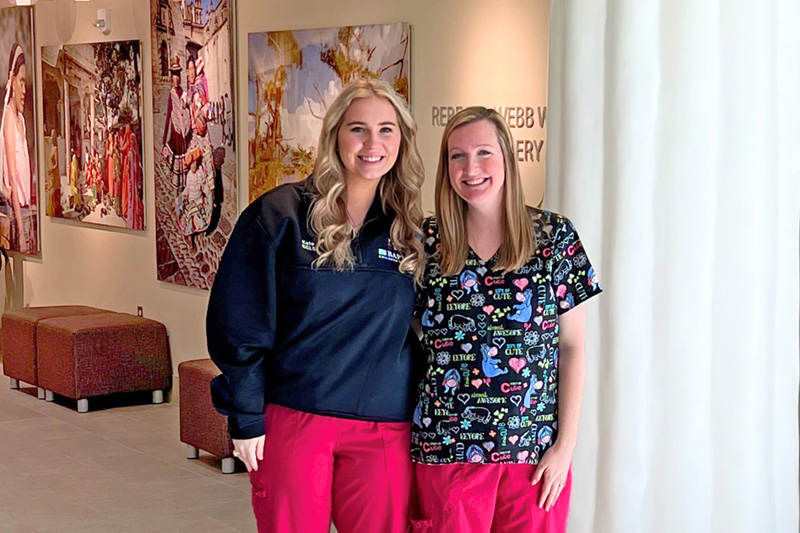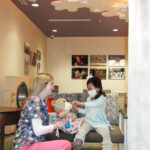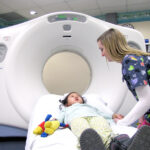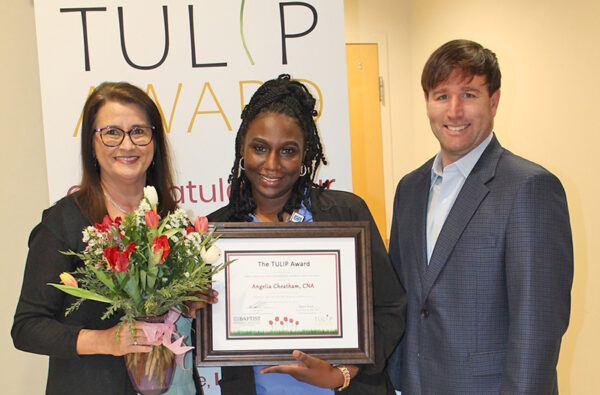In April, P.D. Parrot’s Playroom will open at the Spence and Becky Wilson Baptist Children’s Hospital. It will offer pediatric patients a safe place to play in the hospital. The Toy Foundation awarded Baptist Children’s Hospital a $25,000 grant, administered by the Children’s Hospital Association. The funds will be used to purchase play items, such as interactive manipulatives (blocks and other objects for play and learning), art supplies, a dollhouse and kitchenette.
Named for Baptist’s pediatrics mascot, P.D. Parrot’s Playroom will open in the space formerly used for the pediatric intensive care unit (PICU) waiting room. To learn more about P.D. Parrot’s Playroom, we talked with Certified Child Life Specialists Julianne Scholes and Kate Baker, who work at Baptist Children’s Hospital.
How will the playroom be used?
Julianne Scholes:
Inpatients, whether they’re here for weeks or 24 hours, will be able to go into the playroom with a parent, a staff member or a trained volunteer to play with toys appropriate for their age. Most of our volunteers are pursuing a degree to become a child life specialist.
We plan to have activities and special events in the playroom, and P.D. will visit during holidays and at other times. We’re also planning to add canvas artwork depicting our mascots, P.D. Parrot and Polly, by local artist Connie Lampen.
Kate Baker:
Nurses can also join in the fun in the playroom, but they won’t be able to do anything clinical there, not even taking temperatures or vitals. It’s strictly for play.
Is the playroom geared toward certain age groups?
Julianne Scholes:
The playroom is for all ages, from infants to teens. We’ll have an infant play area with a mat and mirrors along the wall and a colorful hanging mobile created and donated by Amplify Graphics and Branding. The playroom will also have a BEAM interactive projector game system and interactive manipulatives on the wall for all ages, as well as arts and crafts.
Could you explain what a child life specialist does?
Julianne Scholes:
To put it simply, we are here to help patients cope with being in the hospital. We prepare patients for procedures and distract them during procedures. We normalize experiences for them through play. It’s different with every patient, depending on what’s going on with them and their age.
Kate Baker:
We also provide education on the procedures or diagnosis, and we explain to patients why they are here and what we’re doing to help them get better. We assess patients’ developmental level to provide care that is appropriate for them and talk to them in a way they can understand. We help with conversations with the care team and parents to figure out the best way to provide support even after hospitalization.
How will having a playroom benefit patients?
Julianne Scholes:
It’s important to give these kids a safe space that’s not their hospital room. We don’t have a treatment room, so any painful procedures or anything that’s going on that’s negative happens in the patient’s room.
The playroom is a safe space for patients where nothing painful can happen. They can be a kid and play and have a normal environment. This will help with their development and coping and can possibly shorten their length of stay because it’ll help them be more cooperative with their care. It will be a good incentive, too, for when we need to get some difficult things done. They know they have the playroom.
Kate Baker:
Play is important because it normalizes the experience of being in the hospital. For patients with chronic conditions who come here often, having a dedicated space like the playroom will help ease the transition going into this building. For example, the playroom will benefit asthmatic patients by getting them up and moving, which increases the oxygen flow throughout their lungs. So, having this space that encourages patients to ambulate and play can decrease the length of their stay versus patients lying in bed all day.
Now that we have this dedicated space, we can increase patients’ appreciation and willingness to be here. Play is the language of kids. Through play, patients understand that we are trying to help them, and this is not a scary place. Play also helps us assess their understanding so we can provide better care.
Julianne Scholes:
The playroom will boost morale for everyone, including parents. It can be very beneficial for parents to see their children play and act normally. The playroom will help nurses, too, because they want kids to have fun!
We are so excited and grateful to The Toy Foundation and Children’s Hospital Association for helping to make P.D. Parrot’s Playroom possible.








